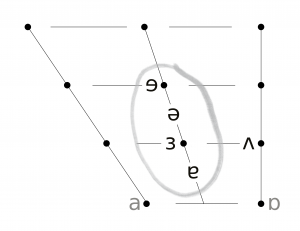27 The commA Lexical Set
 The comma lexical set is a part of the group of Weak vowels that are only found in unstressed syllables. In most varieties of English today, comma is a mid-central vowel, right in the middle of the vowel space known as schwa, /ə/. Though other vowels may have names associated with their symbols, /ə/ is the only vowel sound with its own name. Due to the frequency of unstressed syllables in English words, commA is the most commonly found Lexical Set in English. Wells’ devised his weak vowel lexical sets (comma, letter, happy) to focus on the environment of the final vowel of words like media, after, privacy. However, most linguists and accent trainers use these lexical set keywords for initial and medial (i.e. non-final) environments, too.
The comma lexical set is a part of the group of Weak vowels that are only found in unstressed syllables. In most varieties of English today, comma is a mid-central vowel, right in the middle of the vowel space known as schwa, /ə/. Though other vowels may have names associated with their symbols, /ə/ is the only vowel sound with its own name. Due to the frequency of unstressed syllables in English words, commA is the most commonly found Lexical Set in English. Wells’ devised his weak vowel lexical sets (comma, letter, happy) to focus on the environment of the final vowel of words like media, after, privacy. However, most linguists and accent trainers use these lexical set keywords for initial and medial (i.e. non-final) environments, too.
Note that when speaking the dictionary form of a word, where we try to clearly and emphatically pronounce the word, we’re likely to elevate comma. For example, we might use fleece for the ‹be-› prefix in believe, or face for the ‹-ate› ending in ultimate. Or if we were to emphasize the first syllable of around, we would probably change the comma vowel to a Strong Vowel like strut or nurse. In other words, you can’t trust speaking the word slowly and carefully to help you notice your personal pronunciations of weak vowels.
- 🕊 Free: comma does not require a following consonant, and can even exist on its own, in the article a.
 Weak: in unstressed syllables only. However, some accents have a merger of strut and comma, or non-rhotic nurse and comma, and so in those contexts, it is possible to have the schwa vowel in a stressed syllable.
Weak: in unstressed syllables only. However, some accents have a merger of strut and comma, or non-rhotic nurse and comma, and so in those contexts, it is possible to have the schwa vowel in a stressed syllable.
Spellings
a, ah; e, i, o, u, y
As originally conceived by Wells, where comma is in final position, there are two spellings: ‹a› as in data, or ‹ah› as in pariah. In initial settings, ‹a›, ‹u› and ‹o› as in about, upon, and original are the dominant spellings; if you are dealing with a Weak Vowel merger, ‹e› as in edition is also possible. In medial settings, all the vowel letters are options.
Spellings include: arena, alphabet, villain, brutal, instant, restaurant*, henchman, academy, changeable, pigeon, gorgeous, fuchsia, social, patient, notion, precious, atom, tortoise, famous, chorus.
Pronunciations
The comma lexical set is pronounced with some variation of the [ə] vowel in the vast majority of mainstream accents of English. However, there is a limited range of alternate pronunciations, ranging from a high/close pronunciation with [ɘ], to a mid-centralized vowel closer to schwa [ɜ ~ ɐ].
In some (generally conservative) accents, comma is in contrast with a weak kit vowel, so that roses [ɪ] and Rosa’s [ə] are not homophones. Other “innovative” accents have the Weak Vowel Merger, and so those two words are pronounced in an identical fashion. See the kit lexical set for more information on the Weak kit vowel.
In some traditional accents, final unstressed ‹o, ow› in a word like fellow might be pronounced with comma or letter, e.g. [ˈfɛlə, ˈfɛlɚ]. In the New Englishes of Asia or Africa, vowels don’t always reduce down to schwa, and so, for instance, a word like allow might be pronounced with trap for the first vowel. These are seen as “spelling pronunciations” of the comma lexical set.
When comma occurs at the ends of phrases or sentences, it tends to be lengthened. In so doing, this will frequently change its pronunciation to match strut. You may note this difference in “the red sofa” vs. “the sofa was red”.
The comma vowel occurs most frequently in function words, which are the connective tissue of English, and include articles (a, the), conjunctions (and, but, for*, yet, or*, when, as, because), prepositions (of, on, with, at), pronouns (him, them, it, you), auxiliary verbs (is, am, are*, have, has, do, does, did, was, were*), and modal verbs (can, could, will, would, shall, should). All of these words can be spoken with their Strong Forms, when they are accented and take the full form of a vowel, or with their Weak Forms, where the vowel is reduced to comma. For example, the word and can have trap in its Strong Form (s.f.), and comma, [ənd, ən], in its weak form (w.f.). The exception here is function words spelled with ‹i› (such as him, it, is, did, will) are likely to take weak kit in accents that lack the Weak Vowel Merger. Weak forms function words with /r/, like are, for, or are in the letter lexical set.
Personal Pronunciation
 Let’s try to figure out where in your mouth comma sits. This is tricky, as the vowel may change when we try to “shine a light on it.” You may find it much easier to hear what you’re doing with unstressed syllables by recording your voice saying some words from the lists below, and then slowing the audio down in software (like the free app Audacity, which can allow you to slow the track using “Change Tempo…” from the Effect Menu). If you don’t have the luxury of being able to use your technology to do this, experiment on your own or with a classmate, friend, coach or teacher to identify how your comma vowel compares with others. Without adding any stress or emphasis to the syllable, try lengthening the sound of your comma vowel, and try to lock on to its sound. Once you feel clear as to its quality, then attempt to subtly shift it around from its normal, everyday space in the middle of your personal vowel space—up, forwards, down, and back—in tiny increments. You should feel the top surface of your tongue moving towards/away from middle of your mouth. What’s the smallest noticeable change that you can make?
Let’s try to figure out where in your mouth comma sits. This is tricky, as the vowel may change when we try to “shine a light on it.” You may find it much easier to hear what you’re doing with unstressed syllables by recording your voice saying some words from the lists below, and then slowing the audio down in software (like the free app Audacity, which can allow you to slow the track using “Change Tempo…” from the Effect Menu). If you don’t have the luxury of being able to use your technology to do this, experiment on your own or with a classmate, friend, coach or teacher to identify how your comma vowel compares with others. Without adding any stress or emphasis to the syllable, try lengthening the sound of your comma vowel, and try to lock on to its sound. Once you feel clear as to its quality, then attempt to subtly shift it around from its normal, everyday space in the middle of your personal vowel space—up, forwards, down, and back—in tiny increments. You should feel the top surface of your tongue moving towards/away from middle of your mouth. What’s the smallest noticeable change that you can make?
Using whatever symbol best approximates where you’re feeling your comma, use the following diacritical marks to adjust to better match your sound. If your comma vowel is
- high, use the raised diacritic [ ə̝ ], a small T pointing up
- open, use the lowered diacritic [ ə̞ ], a small T pointing down
- pushed forward, use the advanced diacritic [ ə̟ ], a tiny plus sign +
- pulled back, use the retracted diacritic [ ə̠ ], a tiny minus sign –
- if you add lip-rounding, use the more rounded diacritic [ ə̹ ], a tiny ɔ, which represents the lips rounding forward (to the left).
Alternate Pronunciations
Experiment with the Word Lists, Phrases and Sentences with the following vowels:
As you move the vowels in the directions recommended, see whether that modified oral posture might inspire you to move the articulation of consonants and other vowels in the word in similar ways. Does it remind you of another accent?
Word Lists for comma, in Initial, Medial, and Final Settings
KEY: ![]() comma in initial position,
comma in initial position, ![]() comma in medial position,
comma in medial position, ![]() comma in final position
comma in final position
PLOSIVES
-p
-b
-t
-d
-k
-ɡ
AFFRICATES
-tʃ
-dʒ
NASALS
-m
-n
-ŋ
FRICATIVES
-θ
-ð
-f
-v
-s
-z
-ʃ
-ʒ
Vowels followed by /r/ and /l/ often are affected by the following consonant. When followed by ‹r› this can make the comma vowel into a rhotic or r-colored schwa [ɚ̯], which is the letter lexical set. When followed by ‹l›, the vowel is often pulled back, especially if /l/ is articulated with the dark-l [ɫ], which may move the vowel more towards [ʌ̠].
 In order to practice these vowels without the following consonant affecting them, experiment with the “Consonant Chop” technique. Speak the vowel without the following consonant and all that comes after it, chopping the word off right after the comma vowel. For example, for arrive, you would start by saying schwa, and then, as two units, say “a- rrive”. If you’re working on using the [ə] vowel, that would be [ə—ɹaɪ̯v]. Then try putting the two syllables closer and closer together, [ə– ɹaɪ̯v, ə-ɹaɪ̯v, ə.ɹaɪ̯v, əˈlaɪ̯v].
In order to practice these vowels without the following consonant affecting them, experiment with the “Consonant Chop” technique. Speak the vowel without the following consonant and all that comes after it, chopping the word off right after the comma vowel. For example, for arrive, you would start by saying schwa, and then, as two units, say “a- rrive”. If you’re working on using the [ə] vowel, that would be [ə—ɹaɪ̯v]. Then try putting the two syllables closer and closer together, [ə– ɹaɪ̯v, ə-ɹaɪ̯v, ə.ɹaɪ̯v, əˈlaɪ̯v].
-ɹ*(see near or nurse)
All these words may be said with letter before /r/ in rhotic accents
-l/ɫ
Short Phrases
- Woulda, shoulda, coulda.
- “My karma ran over your dogma.”
- Get the umbrella from the villa.
- Amelia adjusted her Vespa.
- A kilogram of Mexican agave.
- The Uganda propaganda advisor.
- Travolta’s comedic abandon.
- Amanda’s academic agenda.
- What do you wanna do?
- Honda, Mazda and Toyota in America.
- You have to use Adobe Photoshop.
- They agreed to begin in Sri Lanka.
- Rhoma took some of them to Oklahoma.
- The woman liked the sauna more than the stationary bike.
- The availability of the competition statistics.

Sentences
Level 1
Short with 3-4 words, underlined
- Pippa drank vodka at the bar.
- Charlotte got 3 Japanese Yen for 1 Nicaraguan Cordoba.
- The address where the attack happened is secure.
- Tell me the saga of the express to Chattanooga.
- The hydrangeas gave Aviva nostalgia for Asia.
Level 2
Short with 5-6 words, underlined
- Visit Mission Control at NASA’s base in Houston, Texas.
- Aziz studied Suzuki violin from age three to seven.
- Can you assure Aisha that the aeroplane is more than satisfactory?
- Olivia ate a delicious pizza before exploring the Louvre.
- Sergeant deSousa accused the Florida man of aggressive behavior.
Level 3
Medium with 3-4 words, not underlined
- Tereza got a Persian cat in Jakarta, Indonesia.
- Laila Khan is a successful Pashto musician from Peshawar.
- Canadian Lorne Green starred in Bonanza and Battlestar Galactica.
- Mustafa first tasted salsa in Tulsa last August.
- Could Sophia get tested for coronavirus at St. Joseph’s?
Level 4
Hard with 4-6 words, not underlined
- The geologist thought of Europe and Asia as the single mega-continent Eurasia.
- Saoirse [ˈsɜʃə] and Aoife [ˈifə] defended their work to the photography professor.
- Big pharma seems to want you to suffer from iron deficiency leading to anemia.
- The Trimurti is Brahma the creator, Vishnu the preserver, and Shiva the destroyer.
- The Americanization of professionalism around etymology is abominable.
Mergers
Weak Vowel Merger (comma–kit): For some accents, there is a contrast between the weak vowels comma (schwa) [ə] and the unstressed kit vowel, [ɪ], so that words like abbot/rabbit, pigeon/pidgin, Rosa’s/roses, allusion/illusion are pronounced differently. For those that don’t maintain this contrast, these weak vowels are merged and pronounced with comma, schwa [ə].
-
- Erin made an allusion to the illusion that eluded Aaron.*
- Only a select few of the acts become celebrities after Eurovision.
- Khalid is a philosophy professor at a nearby college
- “There’s tons of affordable villas with vintage furniture!”
comma–kit Merger: In Broad New Zealand accents, comma and kit are merged as [ə], except for final comma which is merged with strut. This makes homophones of some high frequency words, mostly in their weak form: in/an, is/as, it/at, his/has, bit/but, kid/could. This is essentially the same output of the Weak Vowel Merger (above). Note that the vowel in kit is often perceived as being analogous to strut (rather than comma) by outsiders, though it should be noted that strut is actually more open than comma–kit in NZ English. The sentences below include comma and kit.
-
- His kid could eat a bit, but is it in his best interests as an adult might attest.
- This house plant would have lived if not for the lack of sunlight.
- I was in a rush this morning and forgot my grocery list at home because I woke up a bit late.
comma-letter Merger: In non-rhotic accents, comma and letter are merged, and both pronounced with some variant of schwa. This is perhaps one of the most common mergers in English. Minimal Pairs when merged are sometimes non-obvious: tuba/tuber, data*/date’er, Lida/leader, PETA/Peter, Silva/silver, Korea/career, Russia/rusher, Donna/Donner, on a/hono(u)r. Below are sentences with comma and letter.
-
- My father left China to start a better career as a miner in Korea.
- Anna had good manners and always helps customers when they have a dilemma.
- Georgia felt major nostalgia when watching old war and soldier movies.
comma and Syllabic /n, l/: In unstressed syllables with /ən/ or /əl/, the vowel is often subsumed by the following consonant which has to have the potential for length. Examples of syllabic /n, l/: than/there’ll* [ðn̩/ðɫ̩], open/opal, Britain/brittle, even/evil, person/Purcell, often/offal, Norman/normal.
(Note that some of these examples make not work in all accents.)
Schwa Deletion, aka Syncope: when the comma vowel is deleted in the middle of a word. Primarily heard in Canadian and US accents, it occurs much more frequently after a stressed syllable, as in desp(e)rate, fam(i)ly, than before, t(o)morrow, p(o)lice. It has been shown to happen more frequently in certain contexts, and is more likely to happen in high frequency words (that we hear often, and can therefore easily predict), than in low frequency words (which are more rare, and thus harder to predict.) This means frequently occurring words like average, catholic are more likely to be heard than less frequent words like alc(o)hol, lux(u)ry[1].
Vowel Reduction/Deletion in 2-Syllable Suffixes: In words of 4+ syllables with suffixes with two syllables, -ary, -ory, -ony, -orough/-oro/-urgh, -berry, -bury, in accents of Britain, and the southern hemisphere, the strong vowels heard in North America (the older form) are reduced to schwa or deleted all together.
Examples: RP GenAm
contemporary [kn̩ˈtɛmpɹəɹi] [kn̩ˈtɛmpɚɹɛɚ̯i]
category [ˈkætəɡəɹi] [ˈkætəɡɔɚi]
ceremony [ˈsɛɹɪməni] [ˈsɛɹɪmʌʊ̯ni]
Scarborough [ˈskɑbəɹə] [ˈskɑɚbɝɹʌʊ̯]
strawberry [ˈstɹɔbɹi] [ˈstɹɒbɛɚ̯i]
Canterbury [ˈkantəbɹi] [ˈkæntɚbɛɚ̯i]
Definite Article Reduction occurs in varieties in the North of England, where schwa in “the” is deleted (and sometimes /ð/ is reduced to /t/, as well). This is usually represented in texts as t’ or th’.
Linking and Intrusive /r/: In most (but not all!) non-rhotic accents, when a word ends in schwa (comma/letter), and that word is followed by a word beginning with a vowel, /r/ is inserted to link the two vowels together. “Linking” /r/ refers to a linkage when there is an ‹r› in the spelling (i.e. letter), and “Intrusive” /r/ refers to a linkage when an epenthetic /r/ is inserted between the two vowels (i.e. when there isn’t one in the spelling).
You’re ͜ r.ideally better ͜ r.off drinking ginger ͜ r.ale later ͜ r.on.
[jɔ ͜ ɹaɪ̯ˈdiəli ˌbɛtə ͜ ɹˈɒf ˈdɹɪŋkɪŋ ˈdʒɪndʒə ͜ ɹˈeɪ̯ɫ ˌleɪ̯tə ͜ ɹˈɒn]
The idea ͜ r.of the sofa ͜ r.and chair coming from India ͜ r.or China ͜ r.is ridiculous.
[ði aɪˈdiə ͜ ɹəv ðə ˈsəʊ̯fə ͜ ɹən ˈtʃɛ ˈkʌmɪŋ fɹəm ˈɪndiə ͜ ɹɔ ˈtʃaɪ̯nə ͜ ɹɪz ɹɪˈdɪjələs]
Schwa Insertion occurs in a variety of contexts and varieties of English:
- in final consonant clusters as in film, helm, worm [ˈfɪləm, ˈhɛləm, ˈwʌɹəm] in Irish English,
- in consonant clusters that are not phonotactically part of an L2 speaker’s L1, as in Bangladeshi English glass [gɪlas] or Spanish English school [əsˈkul] or
- after a goat diphthong before /n/, spelled ‹own› as in grown, known, thrown, blown—[ˈɡrəʉwən], etc. Frequently heard in New Zealand English.
Spelling Pronunciations of comma: African and Caribbean Englishes tend to be syllable-timed, (as opposed to stress-timed, as other Englishes are) and so they are more likely to have less contrast between stressed and unstressed syllables, and there is much less vowel reduction. As a result, comma tends to be treated as full vowel, whose pronunciation is based primarily around its spelling.
For Example:
with ‹a› spelling: comma [ˈkɒma], around [aˈɹaʊ̯nd]
with ‹e› spelling: latest [ˈleɪ̯tɛst], open [ˈopɛn]
with ‹u› spelling: support [ˈsupot], popular [ˈpɒpjula]
with ‹o› spelling: continue [ˈkontinju], official [oˈfiʃal]
Review
- Ryu, Na-Young and Sung-Hoon Hong. 2013. “Schwa deletion in the conversational speech of English: The role of linguistic factors.” Linguistic Research 30(2), 313-333. ↵
A vowel that only occurs in unstressed syllables, and codas. As it can be in final position it is by nature "free," but it is unstressed. Generally these are happY, lettER, and commA, though some argue that some English varieties have a weak GOOSE vowel as well, which is sometimes dubbed "schwoo." The Alternative Lexical Set keyword for this is inTO.
The strongest form of a word, with none of its vowels reduced.
Function words are words that have little or ambiguous lexical meaning and express grammatical relationships among other words within a sentence. The opposite of "content words" . Examples include prepositions (to, from, of), pronouns (he, they, we), auxiliary verbs (do ___, have) , conjunctions (and, or), grammatical articles (the, an) or particles (to, not, let) .
When a word is pronounced with a full vowel, when the word is stressed (and as the citation/dictionary form, or in isolation form, when a word is mentioned standing alone). Opposite of Weak Form.
When a word is pronounced with (a) reduced vowel(s), usually schwa or merely with a syllabic consonant, so that it has no prosodic stress. Constrasts with "Strong Form." e.g. to pronounced as [tə] rather than [tu].
A segment or sound that appears in the a word where it wasn't there previously; a sound that is included in a word when there is nothing in the spelling of the word to indicate it should be there. e.g. fence for many speakers may have an epenthetic /t/, [fɛnts] rather than [fɛns].

